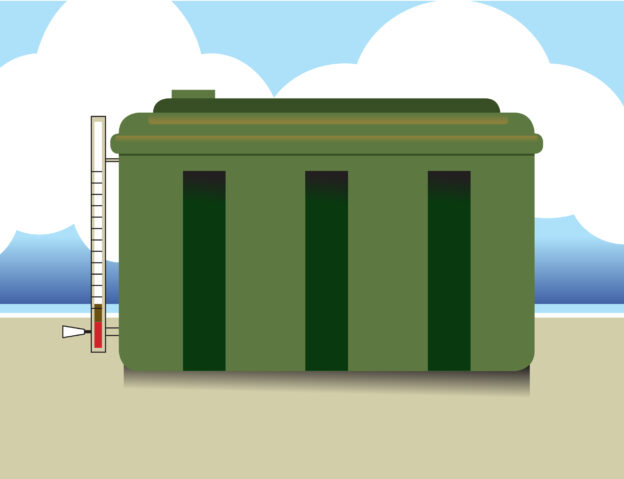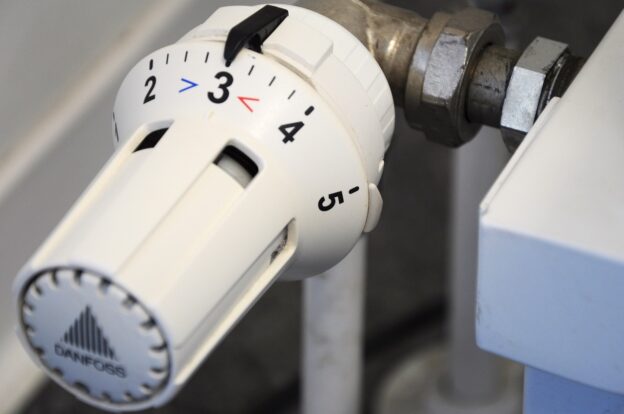With strong winds, storms and rain, and now snow, we’ve seen it all over these recent months. Storm Isha, closely followed by storm Jocelyn, brought widespread strong winds and heavy rain, particularly across the north of England. Fallen trees, damage to buildings, and loss of power impacted many of us, but one thing we may have overlooked is how the continual wet weather may have impacted our heating oil tanks.
In this blog we’re going to take a look at what to look out for, how to dispose of water if you do have it in your tank, and how to avoid it getting into your tank in the first place. After all, prevention is always better than cure as water contamination can cause various issues such as corrosion of your tank, microbial growth and decreased heating efficiency. And often the first you’ll know about it is when your boiler starts playing up!
How does water enter a heating oil tank?
Condensation:
Seasonal changes where temperatures fluctuate throughout the year can cause condensation to form inside the tank. The condensation will accumulate at the bottom of the tank as water is denser than heating oil. As the condensation builds up, it will, over time, lead to an accumulation of water in the bottom of the tank. Condensation is more common in the warmer months of the year as the weather starts to warm up. Your tank’s internal temperature will be cooler than the outside temperature, and as moist air cools down inside the tank, water vapour will form water droplets.
Over time this water, along with a sludge made up of black particles in the heating oil, will build up, and when you have a delivery, can be stirred up and fed through to your central heating boiler, affecting its performance.
Using our Premium Heating oil can help. It’s specially formulated to reduce the amount of sludge that builds up in your tank over time, as well as make your boiler run at its best. It also contains corrosion inhibitors which will help stop your tank from rusting, as well as metal deactivators that help reduce fuel degradation. And it’s environmentally friendly too!
Leaks:
If your heating oil tank has cracks or holes, faulty seals, a damaged vent, or a badly fitting lid, rainwater can seep into the tank. This is why we recommend you inspect your tank on a regular basis. Check the tank and pipework yourself for signs of cracks, corrosion or any other physical damage. Also, look out for any signs your tank may be leaking such as oil stains on or around the tank, or a strong smell of oil. We also recommend you have your tank inspected annually – an OFTEC registered heating oil engineer will do this as part of your annual boiler service.
If you do suspect your heating oil tank is leaking, get immediate advice from an OFTEC registered oil heating engineer.
How to check if you have water in your tank
If you suspect you have water in your tank, it’s all but impossible to detect it from an external examination alone as water at the bottom of your tank can’t be seen.
A water-finding paste can be used which is a cost-effective way of finding out whether or not you do have water in your tank. Simply smear the end of a clean garden cane or dipstick with the paste, making sure that your cane or dipstick is long enough to reach the bottom of your tank. Leave it there for a minute or so, then when you pull it back out of your tank, if there’s water present, the paste will react, and will change colour.
How do I get rid of water contamination?
If you do have water in the bottom of your tank, it’s important to get rid of it as soon as you can and before it builds up sufficiently to enter the fuel line and do damage to your boiler. There are a couple of ways you can do this.
If you have an old metal tank, there may be a run-off valve at the bottom which can be used to drain off the water. You should always drain it into a container and this should then be sealed and stored before being disposed of – it’s very important that it doesn’t spill and cause contamination.
However, plastic tanks don’t have this facility so if you’ve only got a small amount of water in your tank, you can use a highly absorbent tank dryer. It’s a water filtration device which sinks into the bottom of your tank with a cord attached, and will absorb the water. When it’s fully swollen, you will need to remove it from your tank and dispose of it safely and responsibly as any water that’s removed will be contaminated.
Tank sponges are also available – these are simple to use and have a recovery string so they can be removed from the tank easily.
However, if you have a large quantity of fuel in your tank, in other words, more than a few centimetres, we would recommend you call on a professional. An OFTEC registered oil heating engineer will be able to assist and also advise on how to prevent you from getting water in your tank again in the future.
Once any water in your tank has been removed, you may need to flush the boiler feed pipe, and also replace fuel filters potentially. Again your engineer will be able to assist with this.
We hope you’ve found this information useful – keeping an eye on your tank all year round is definitely the way to go to keep your heating oil tank water-free, avoid any problems in the future, and avoid the potential of big repair bills coming your way. It’s definitely worth the effort.
But we’re always here to help and advise you if you do have any concerns. Just call us on 01757 270 337 or email us at sales@whiterosefuels.co.uk.




